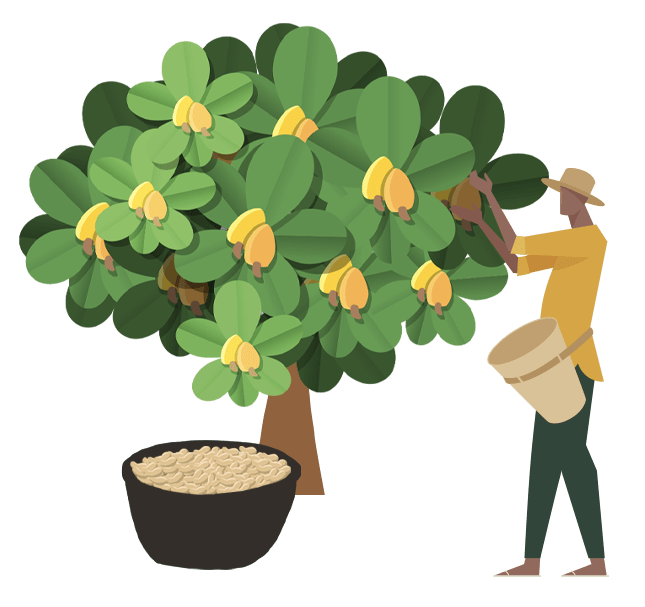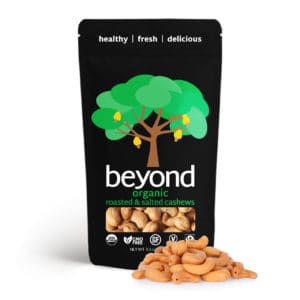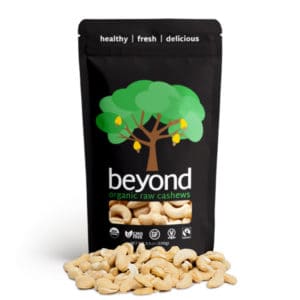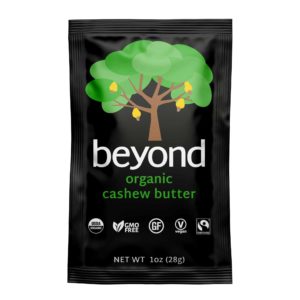Free shipping on all U.S. orders over $59! Dismiss
You may have enjoyed a handful of cashews as a snack, or eaten a dish containing cashews, but you may not know just how nutritious they are. When Beyond the Nut decided to launch a snack brand, we focused on a local and holistic to processing, roasting, and salting cashews. We believe that we are more than a snack brand, but help people to change their lives. It all starts with cashews, for us. Read More.

snack size

snack size

snack size
Sale!
Though they are called nuts, cashews are actually a kind of seed that comes from cashew apples, a fruit that grows on tropical trees. Each cashew apple can produce one or multiple cashew nuts. Unlike seeds that grow inside the flesh, these hang from the bottom of the cashew apple, appearing like a small swollen stem attached to the fruit. This is why the name “cashew” comes from the Portuguese word caju, meaning ‘nut that produces itself’.
The cashew seed is then harvested by hand, where it is found in a hard shell made of two separate layers. Between these layers is the phenolic resin urushiol, which is also found in poison ivy and poison oak as the agent that causes a rash when contact is made. This substance is removed during the shelling process and can then be used for other products such as paint, insecticide, varnish, and industrial products. This potential toxicity is why you do not find cashews sold in their shell.
While cashew apples themselves are delicious, they are extremely perishable and begin the process of fermentation immediately after harvesting, leaving them fresh for 24 hours at the longest. For this reason, they are rarely eaten by anyone who is not a grower or living near a cashew orchard. Sometimes they can be found canned, in jams, or as the base of a liqueur. The juice is also occasionally packaged for regional sales.
Originally, cashews were bred in north-eastern Brazil before being imported to Mozambique and the Indian coast. From there, throughout the 16th century, cashews spread throughout Southeast Asia and finally reached Africa. Today, the most common places to grow cashews are tropical areas such as India, Brazil, Vietnam, Nigeria, Indonesia, and Tanzania. Beyond the Nut grows all cashews in Benin, West Africa, where they are also processed, roasted, salted, and sold locally.
While you may see cashews in the grocery store labeled as “raw”, this is not quite accurate. All cashews undergo a heating process of some sort to remove the shell and the toxic substance within it. Cashews sold as raw have undergone a single heating process, while “roasted” cashews have been cooked a second time to add color and flavor, sometimes with salt or other seasoning added. Dry-roasted cashews were cooked without the addition of any oils.
Many people eat cashews in the form they are sold in as a nutritious snack, though they can be treated in a number of ways as a culinary ingredient. Cashews are treated as a nut, often being pureed into butter used as a spread or ingredient in smoothies. It has also become popular to blend cashews into a creamy texture for use in dairy alternatives like cashew milk, cheese, and cream sauces, or sour cream.
Cashews can also be a common ingredient in cooking, as they yield a light-to-dark yellow oil that can be used as a salad ingredient or finishing oil. Asian and Indian cultures commonly use whole or chopped cashews as an ingredient in curries and stir-fries.
Cashews are high in a number of vitamins and minerals and are known to be a healthy choice for snacks and ingredients. Each cashew is estimated to contain around 8 calories, and a serving size is around 18 individual cashew nuts.
One of the reasons cashews are considered very healthy is that they are high in monounsaturated fatty acid content. These fatty acids have various health benefits, and it has been suggested that an ounce of cashews per day can be a preventative measure against heart disease.
Cashews also contain fiber, making them good for digestion, and iron that keeps blood healthy and works to prevent iron deficiency known as anemia. Cashews have more iron than any other nut. In addition to the iron promoting blood health, minerals such as magnesium, calcium, selenium, and zinc all contribute to this as well. Most of the minerals a body needs to be healthy are found in cashews.
The nut also contains high levels of amino acid and protein, which can help keep muscles and bones strong. Anti-inflammatory properties are also present, as well as antioxidants that protect against stress. Roasting the cashews actually increases the number of antioxidants found in the nut as well.
Cashews themselves do not contain sodium, but many forms are salted, so it is important to not consume levels of salt that negatively impact heart health.
Because they are rich in vitamins and minerals, cashews have been shown to have a number of positive effects on health in different areas.
One of the largest areas where cashews promote health is in the heart because they contain antioxidants and unsaturated fatty acids. The anti-inflammatory effects of these improve heart health so much that scientists believe eating 5 servings of the nut per week can help reduce the mortality risk associated with heart disease. This is in part because regular consumption of the nut can lower your cholesterol without impacting blood fat levels. In addition, cashews are not known to increase your weight, so the benefits to the heart outweigh the risks.
Regularly eating cashews can also help manage the symptoms of other conditions like hypertension and diabetes. Minerals found in cashews can help regulate both blood pressure and blood sugars, which can be beneficial for those who have problems naturally regulating these levels.
While there are many benefits to eating cashews roasted or “raw” as sold, many people use cashew milk and other dairy alternatives to boost health as well. All of the vitamins and minerals that provide these benefits are present, and it can replace less healthy ingredients you may have used in dishes.
Cashews are not only healthy, but they are also delicious, an easy snack to have around, and a versatile ingredient to add to your kitchen. When you purchase cashews from Beyond the Nut, you are not only getting all the benefits of cashews, but you are helping a local community to thrive and lift up others. In West Africa, we work with local farmers, entrepreneurs, and engineers to ensure our operation is thriving and sustainable, and we employ over 650 people in Benin. This local and holistic focus allows us to serve our community by providing purpose and livelihood while offering you hig